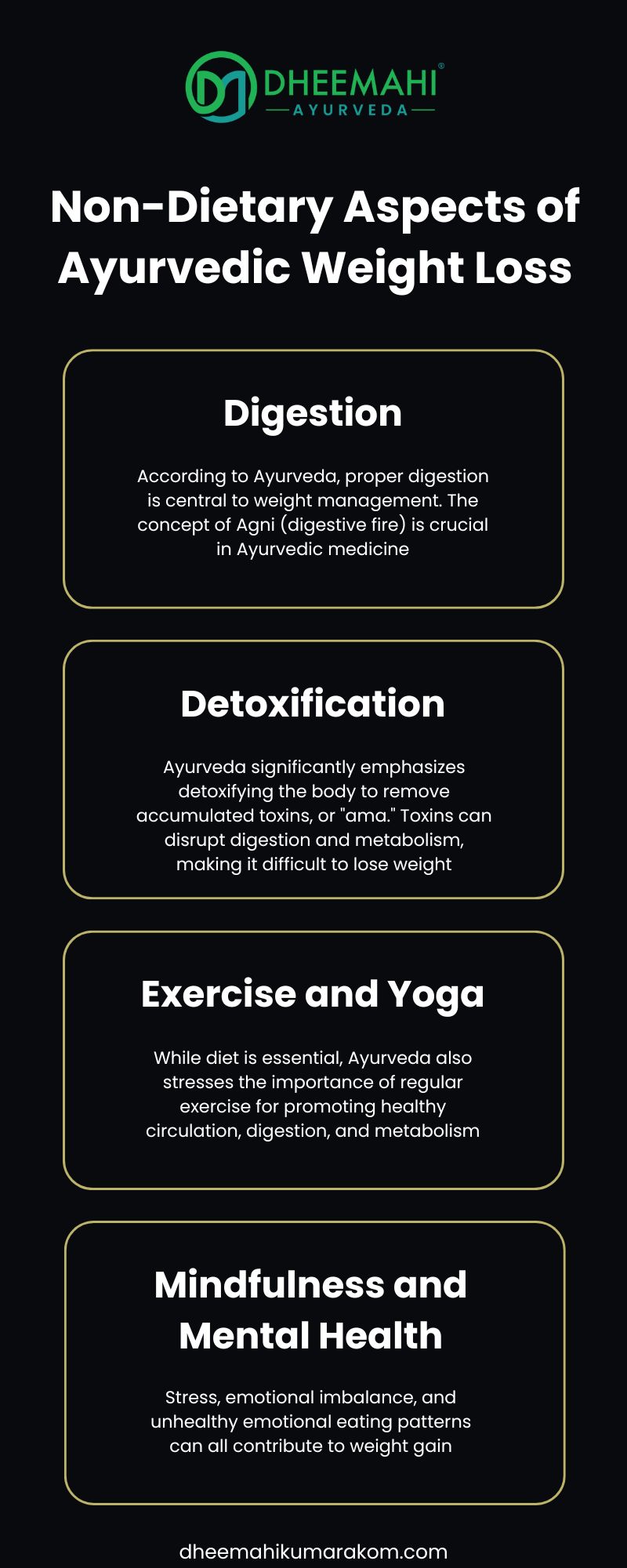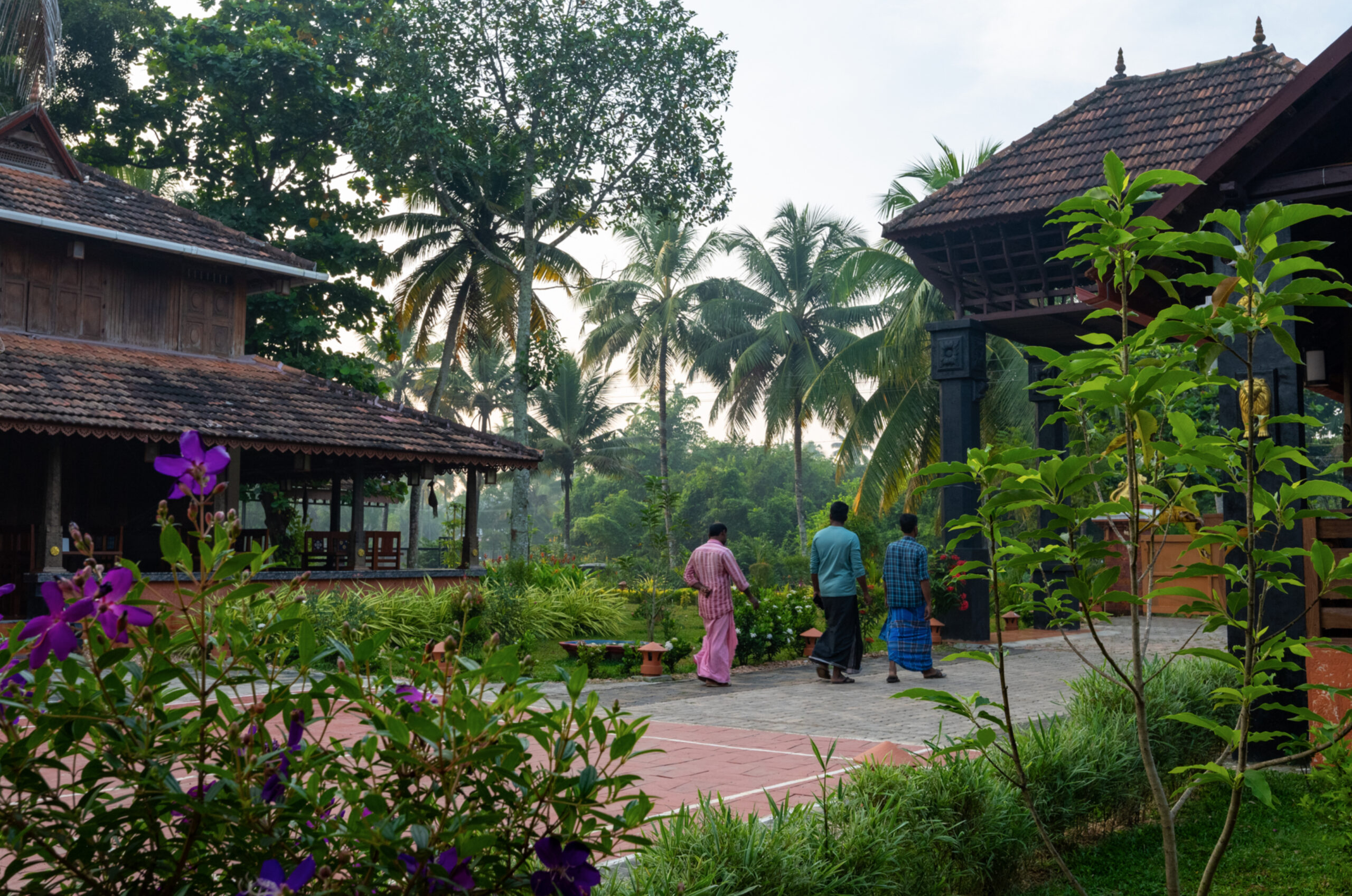Common Myths about Ayurvedic Weight Loss Treatment
Dr. Amritha
Ayurveda has gained considerable attention worldwide for its holistic approach to health and wellness. With natural remedies, personalised treatments, and a focus on long-term wellness, many people turn to Ayurveda for help with weight management.
From unrealistic expectations about rapid weight loss to misunderstandings about its core principles, these myths can cloud the true potential of Ayurvedic treatments. By understanding the truth behind these myths, you can better appreciate the value of Ayurveda and how it works for weight loss and achieving balance in body, mind, and spirit.
Myth 1 – Ayurvedic Weight Loss is Only About Dieting and Fasting
Ayurveda views weight loss as part of a holistic process that involves much more than diet alone. A healthy Ayurvedic approach to weight management incorporates lifestyle changes, mental well-being, detoxification, and exercise. These are all essential for restoring the balance necessary to maintain a healthy weight.
Here are some non-dietary aspects of Ayurvedic weight loss:
Digestion: According to Ayurveda, proper digestion is central to weight management. The concept of Agni (digestive fire) is crucial in Ayurvedic medicine. If your digestive fire weakens, you may experience sluggish digestion, leading to toxin buildup and weight gain. Ayurveda strengthens Agni through specific herbs, spices, and lifestyle changes.
Detoxification: Ayurveda significantly emphasizes detoxifying the body to remove accumulated toxins, or “ama.” Toxins can disrupt digestion and metabolism, making it difficult to lose weight. Ayurvedic practices such as
Panchakarma (a detoxification therapy) are designed to cleanse the body, restore balance, and rejuvenate the digestive system.
Exercise and Yoga: While diet is essential, Ayurveda also stresses the importance of regular exercise for promoting healthy circulation, digestion, and metabolism. Practices like yoga and pranayama (breathing exercises) are encouraged to reduce stress, support mental clarity, and increase physical activity. The right type of bodily movement is personalized depending on your dosha and physical condition.
Mindfulness and Mental Health: Stress, emotional imbalance, and unhealthy emotional eating patterns can all contribute to weight gain. Ayurveda recommends mindfulness practices like meditation and self-care routines to support mental clarity, emotional balance, and a positive relationship with food. In this way, Ayurvedic weight loss incorporates cognitive and emotional aspects of health as part of the overall strategy.

Myth 2 – Ayurvedic Treatments Are Slow and Ineffective
One of the key principles of Ayurveda is its emphasis on long-term health and prevention rather than relying on quick fixes. While modern medicine may often offer fast relief for certain conditions (e.g., painkillers or antibiotics), these solutions can have side effects and may only temporarily treat symptoms without addressing the underlying causes of the illness.
Ayurvedic treatments may take more time to show results because they aim to correct imbalances at a deeper level. The ayurvedic treatment plans might involve adjusting the diet, recommending herbs, practising stress management techniques, and improving sleep.
These steps take time to work synergistically and fully restore the digestive system to balance. However, the changes are often more permanent and carry fewer risks of relapse when compared to relying on medication that only suppresses symptoms.
Moreover, Ayurveda encourages preventative care—helping individuals maintain health and prevent future illness. This is a much longer-term approach than simply addressing a health condition when it becomes acute.
Myth 3 – Ayurvedic Weight Loss Treatments Are the Same for Everyone
Ayurveda is based on the concept of the doshas — three fundamental energies that govern all aspects of life, including physical health, mental state, and emotional tendencies. The doshas are Vata, Pitta, and Kapha, and each individual has a unique combination of these energies, which determines their physical constitution, personality traits, and even their predisposition to specific health conditions.
- Vata individuals are typically lean, energetic, and creative but may suffer from irregular digestion, dryness, and fluctuating weight.
- Pitta types are often of medium build, with a strong appetite and metabolism, but may struggle with stress-related weight gain or inflammatory conditions.
- Kapha types are generally heavier, with a slow metabolism and a tendency to store excess weight. Therefore, they may need to focus on stimulating their metabolism and increasing their physical activity.
In Ayurveda, weight loss treatments are tailored to your dosha. For example, a person with a predominance of Kapha may be advised to follow a stimulating exercise routine, eat lighter, spicier foods, and focus on reducing excess weight through metabolic stimulation.
In contrast, someone with a Pitta constitution may need to manage stress more effectively to prevent emotional eating and focus on cooling, anti-inflammatory foods.
Ayurvedic treatments are personalized to suit an individual’s unique constitution and life circumstances.
Myth 4 – Ayurvedic Weight Loss Treatments are Expensive and Only for the Elite
One of the most significant misconceptions is that Ayurveda requires expensive treatments and rare ingredients. In reality, Ayurveda focuses on simple, everyday practices that can be easily incorporated into daily life without breaking the bank. Some examples include:
- Dietary Adjustments: Ayurveda recommends eating seasonal, local foods balanced for your unique body type (your dosha). The foods recommended for weight loss—like whole grains, vegetables, lean proteins, and natural spices—are generally affordable and widely available in most grocery stores. Common Ayurvedic spices like turmeric, cumin, ginger, and cinnamon can be easily found and are often staples in many kitchens.
- Simple Home Remedies: Many Ayurvedic weight loss solutions involve basic home practices such as drinking warm water with lemon, starting your day with a light, balanced breakfast, or drinking herbal teas to boost metabolism. These remedies don’t require expensive products and can be made with ingredients you likely already have at home.
Some Ayurvedic wellness centres or detox retreats can be costly, especially in luxury settings. However, these treatments are unnecessary for anyone looking to integrate Ayurveda into their weight loss journey. Panchakarma, for instance, is a well-known Ayurvedic detox therapy that can be pricey at a high-end clinic, but it is not the only way to benefit from Ayurveda.

Ayurvedic weight loss treatment in Dheemahi
At Dheemahi, we offer Ayurvedic weight loss treatment in Kerala that embraces the core principles of Ayurveda to support individuals on a safe and sustainable weight loss journey. Our holistic approach doesn’t just focus on shedding excess pounds; it promotes overall balance of the mind, body, and spirit to help you achieve lasting health and vitality.
Our weight loss programs are tailored to each individual’s unique needs, featuring personalized diet plans, therapeutic yoga practices, mindful eating habits, and effective detoxification techniques. These elements come together to cleanse the body, boost metabolism, and nurture mental well-being, all within the serene surroundings of Kerala.
Whether you’re new to Ayurveda or familiar with its benefits, Dheemahi offers compassionate, personalized guidance to help you achieve your wellness goals naturally.
How Our Booking Process Works
The unique approach involves a series of discussion during your initial decision-making process to make sure that we will be able to match your expectations with our treatment.
Based on the discussions with you our team of expert doctors will design the best treatment package personalized for your needs.
01
Consultation Form
Fill out our consultation form, and let us know when will you be available for our doctor to talk to you
02
Discussion with Doctor
Discuss your health condition and expectations with our doctor.
03
Booking Confirmation
Confirm the booking by making a payment of 50% advance.
Say Goodbye to Health Woes & Hello to Healthy Living
Dheemahi Ayurvedic Pvt Ltd
12/386 Varaputhara Road
Kumarakom, Kerala, India
Pin 686563
Dheemahi Ayurvedic Centre, Near Neelimangalam Bridge, Kumaranaloor, Perumbaikad.P.O, Kottayam, Kerala, India, Pin 686016
Other Treatments
Karkidaka Chikilsa | Ayurvedic Treatment for Depression | How to Reduce Stress Naturally | Autoimmune Disorders | Mental Health Ayurvedic Treatment | Weight-Loss Treatment | Frozen Shoulder Ayurvedic Treatment | Diabetes Ayurvedic Treatment | PCOS Ayurvedic Treatment | Celiac Disease Treatment | ayurvedic treatment for skin diseases | nervous system ayurvedic treatment | Back Pain Ayurvedic Treatment | Cervical Spondylitis Ayurvedic Treatment | ayurvedic treatment for blood sugar | Fatty Liver Ayurvedic Treatment | Knee Pain Ayurvedic Treatment | Migraine Ayurvedic Treatment | Osteoarthritis Ayurvedic Treatment | Psoriasis Ayurvedic Treatment | Sinusitis Ayurvedic Treatment | Ayurvedic Detox Treatment | Migraine Ayurvedic Treatment | Ayurvedic Treatment for Rheumatoid Arthritis | Ayurvedic treatment for joint pain | Ayurvedic treatment for ulcerative colitis | Panchakarma Treatment |
